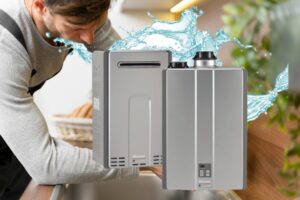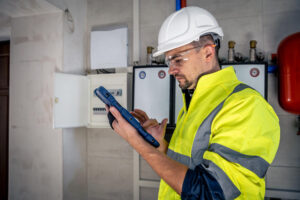A tankless water heater, also known as an on-demand water heater or instantaneous water heater, is a modern and energy-efficient alternative to traditional tank water heaters. Unlike traditional models that store and continuously heat a large volume of water, tankless water heaters heat water only when it is needed.
Are all tankless water heaters the same
When it comes to tankless water heaters, one size does not fit all. Much like fingerprints, each household has unique needs, and selecting the right unit is crucial. Tankless water heaters come in various sizes, capacities, and fuel types. Gas or electric? Point-of-use or whole-house? Understanding your specific requirements is the first step toward choosing the perfect tankless water heater.
Understanding the Basics
Tankless water heaters operate on a simple principle: heating water on demand. Unlike traditional tank heaters that store and continuously heat a large volume of water, tankless units only heat water when you turn on the tap. This not only saves energy but also frees up valuable space in your home.
Gas vs. Electric
One of the primary decisions you’ll face is choosing between gas and electric tankless water heaters. Gas units tend to be more powerful and are suitable for larger households with high hot water demand. On the other hand, electric units are often more energy-efficient and may be a better fit for smaller households or regions with lower gas availability.
Point-of-Use vs. Whole-House
Consider where you need hot water the most. Point-of-use tankless water heaters are ideal for specific appliances or locations, such as bathrooms or kitchens. Whole-house units, on the other hand, can provide hot water to every tap and shower in your home simultaneously.

How does a tankless water heater know when to heat water
Tankless water heaters are equipped with advanced technology that allows them to know precisely when to heat water. The key player in this process is the flow sensor, which detects when hot water is requested. Let’s take a closer look at the mechanism that makes tankless water heaters so efficient.
Flow Sensors: The Brain Behind the Operation
When you turn on a hot water tap, the flow sensor signals the unit to start heating water. This immediate response eliminates the need for a storage tank, providing hot water on demand. The flow sensor ensures that energy is only consumed when necessary, contributing to both energy and cost savings.
Modulating Gas Valves
Gas-powered tankless water heaters often feature modulating gas valves. These valves adjust the amount of gas used to meet the desired temperature, providing a precise and consistent flow of hot water. This not only enhances efficiency but also ensures a constant and comfortable water temperature.
Temperature Sensors
Temperature sensors play a crucial role in maintaining the desired hot water temperature. By continuously monitoring the outgoing water temperature, the unit can make real-time adjustments to ensure a consistent and enjoyable experience.
How do I know what tankless water heater I need
Selecting the right tankless water heater involves considering various factors, including your household size, hot water usage patterns, and available fuel sources. Here’s a step-by-step guide to help you make an informed decision.
Assessing Your Hot Water Needs
Begin by evaluating your household’s hot water demands. Consider the number of bathrooms, appliances, and simultaneous hot water usage. A larger household with multiple bathrooms may require a higher-capacity unit, while smaller households can benefit from more compact options.
Determining Fuel Type
As mentioned earlier, the choice between gas and electric depends on factors such as energy efficiency, availability of fuel sources, and the size of your household. Evaluate the pros and cons of each type to determine which aligns best with your preferences and requirements.
Calculating Flow Rate
The flow rate, measured in gallons per minute (GPM), indicates the amount of hot water the unit can deliver. Calculate your peak hot water demand by considering the number of fixtures you may use simultaneously. Choose a unit with a sufficient GPM to meet your household’s needs.
Considering Energy Efficiency
Tankless water heaters are renowned for their energy efficiency, but not all units are created equal. Look for energy efficiency ratings, such as the Energy Factor (EF) for electric units or the Uniform Energy Factor (UEF) for gas units. Higher ratings translate to more energy savings over time.
What is the downside of a tankless water heater
While tankless water heaters offer numerous advantages, it’s essential to acknowledge their limitations. Understanding the potential downsides will help you make an informed decision based on your specific circumstances.
Upfront Cost
One of the primary drawbacks of tankless water heaters is their higher upfront cost compared to traditional tank heaters. However, it’s crucial to view this as an investment that pays off over time through energy savings and increased longevity.
Installation Complexity
Installing a tankless water heater may require modifications to your existing plumbing and electrical systems. Professional installation is recommended, adding to the overall cost. Despite the initial complexity, the long-term benefits often outweigh the upfront challenges.
Limited Flow Rate
While tankless water heaters provide instant hot water, they have a maximum flow rate. This limitation means that using multiple hot water fixtures simultaneously may reduce the overall water temperature. It’s essential to choose a unit with an adequate flow rate to meet your household’s needs.
Cold Water Sandwich Effect
Some users may experience a phenomenon known as the “cold water sandwich effect.” This occurs when hot water is used, and then there’s a brief period of cold water before the unit adjusts and provides hot water again. While not a dealbreaker for many, it’s essential to be aware of this potential quirk. By understanding the nuances of these systems, you can confidently choose the right unit for your household. Remember, the upfront investment is a small price to pay for the convenience, energy savings, and endless hot water that a tankless water heater can provide. Embrace the future of hot water and make the switch today!

